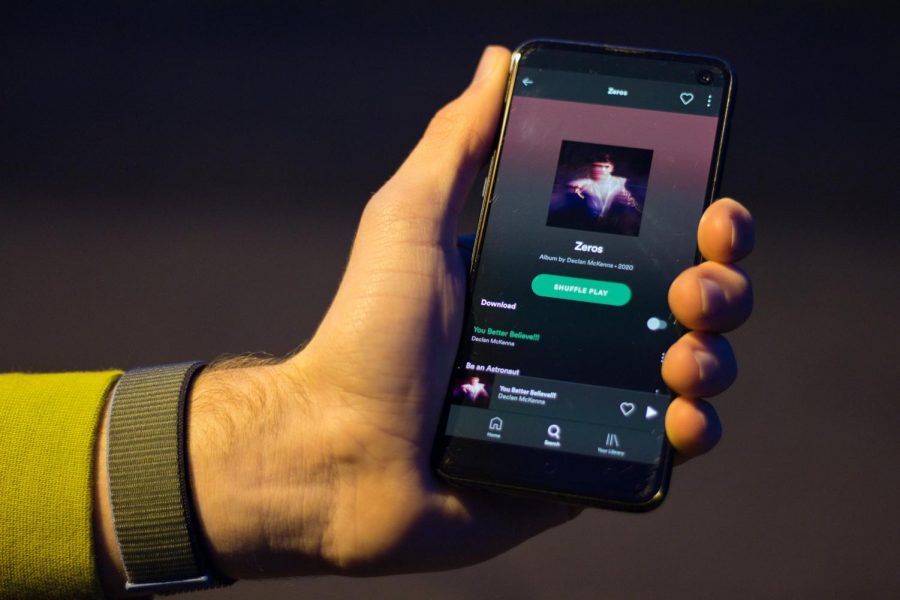Immerse Yourself in a Dystopian World of Indie Rock With Declan McKenna’s “Zeros”
McKenna’s sophomore album incorporates relevant ideas about the many ways our world can be destructive.
February 3, 2021
Smack dab in the middle of a pandemic, fans of Declan McKenna were graced with the release of his second album: “Zeros.” Packed with alternative and indie sounds with hints of pop and rock, his lyrics build a space-themed dystopia where the end of the world is quickly approaching — and we are at fault.
McKenna clearly displays his growth as an artist on “Zeros,” following his debut album “What Do You Think About The Car,” released in 2017 when he was only 17 years old. Much of McKenna’s popularity came from his song “Brazil,” an extremely catchy song criticizing the corruption of FIFA.
His two albums sound more different than alike, though incorporating social and political issues into his lyrics is a common theme throughout all of McKenna’s music.
“Zeros” starts strong with “You Better Believe!!!,” a fast-paced, guitar-heavy song about the hole we are digging ourselves into, one that will eventually become impossible to climb out of. His lyrics are centered around technology and apocalyptic images — rockets, lasers, and asteroids — all being metaphors for the idea that we are walking through a world under threat, and one with a destructive nature.
But, throughout the album, the tone isn’t detached from reality or focused on a fantasy. It’s human-oriented. It involves reality. Mentions of Nike trainers or references to England, where McKenna is from, take the overwhelming theme of destruction and center it around ourselves: we contribute to the destruction, but we can also do something about it.
To further give the album relatability, McKenna introduces the character of Daniel in the second track, “Be an Astronaut.” Daniel is a recurring character throughout “Zeros,” and he has lost himself. In “Be an Astronaut,” Daniel is struggling with his wants and the messages sent to him by a critical and technology-filled world.
“Be an Astronaut” not only connects to the album’s concepts of space, but the song itself is insane. Guitar solos, layered vocals, and the flow from verse to chorus and back again make this song one of my favorites on the album.
In one way or another, Daniel is referenced in most songs on the album. Sometimes the character is explicitly sung about; other times the themes he represents are implied. In track five, titled “Daniel, You’re Still a Child,” McKenna sings of frustration with others and the criticisms they place on people from such a young age.
Though the melody itself is not one of my favorites, I think that track five is essential in continuing McKenna’s narrative and developing the theme of destruction — destruction that we can prevent — in his music. In an interview with Radio X, McKenna said “this world isn’t designed for everyone.” The song is about how people are told off for simply being themselves.
Track three, “The Key to Life on Earth,” grapples with ideas of wealth and how people treat one another. Somehow, McKenna took lyrics about ignorance and the disparities between people and turned it into an upbeat song questioning the key to life on earth, and whether or not any of us truly know what it is because of how differently we all walk through life.
McKenna continues telling his story of an abstract world throughout the album, touching on his concerns for the future, such as social media and the path technology is taking. “Beautiful Faces” speaks to the intimidating role of social media in our lives, while songs like “Emily” focus on the toxicity of relationships and how damaging others can be on a more personal level.
I personally love “Emily” because of how it is different from the other tracks musically, but it still flows with the overall album. McKenna utilizes sweet-sounding harmonies and also incorporates some acoustic elements, even though this ‘pretty’ song touches on an arguably difficult topic.
With track seven, “Twice Your Size,” we’re getting closer to the end of the 10-track album: At this point, the world that McKenna has created in “Zeros” is falling apart, and the environment is wasting away under harsh conditions. This is my least favorite song on the album, but I think it is lyrically impressive how McKenna has taken a very real problem in our world and tied it into his dystopia.
“Rapture,” track eight, sounds the most futuristic to me. McKenna includes many distorted and electronic sounds, giving it a sort of apocalyptic feel. McKenna described this song as “an anxious jam” in the track-by-track breakdown with Radio X, because the song is about those who might claim socially relevant topics to be conspiracies.
The album concludes with “Eventually, Darling.” McKenna sings of how love is temporary and that “everyone leaves eventually, darling, don’t be afraid,” which to me, takes a lonely thought and turns it on its head. It is an acknowledgment of change, and the song concludes the album on a hopeful note.
The final lyric of the album is a question: “Would you do it again?” Would we, the listeners, go through personal loss and live in a threatened world again, so that we can change it?
Aside from the deeper meanings of “Eventually, Darling,” the song is mellower compared to the fast-paced songs that open the album, and has a catchy melody. It reminds me of the tracks on McKenna’s first album, which I am a big fan of.
“Zeros,” to me, is not an album that one can sit down and listen to while just going about their day — you have to be in a specific mood to listen to it from start to finish. The songs individually make great additions to your playlists, but the album as a whole is somewhat dreary, because the joyful sounding songs communicate heavy themes.
Due to COVID-19, the tour for McKenna’s new album has been postponed, but in the meantime, he released a live performance of “Zeros” on his YouTube channel.
McKenna’s second album is different from his first, though I highly recommend listening to both “Zeros” and “What Do You Think About the Car.” The variety of topics that McKenna sings about and the instrumentals that he incorporates into his songs cater to a specific audience, but his music is underrated nonetheless.
I give “Zeros” a 7/10, because while the album itself has many patterns and metaphors for fans to analyze, there are a few songs whose melodies are skip-worthy. Most songs have voice effects or another tech-sounding element, and while that may make one song stand out, it can become overused.
McKenna, who is just 22, clearly has a successful future ahead of him. He voices important ideas that will hopefully get people to consider change — and he’ll get you nodding your head and singing along in the meantime.





